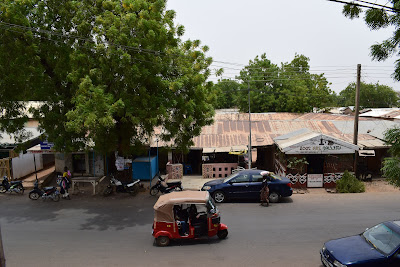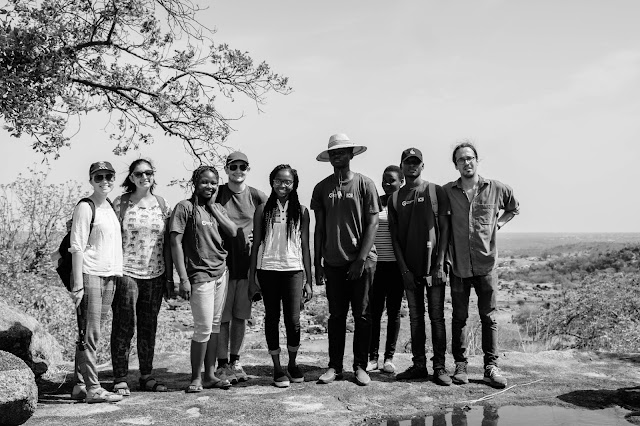Welcome to Bolga
 |
| Commercial Street, Bolgatanga. Roots Art Gallery to the right |
After completing our three-day training session in Tamale we finally headed up north to Bolgatanga, the capital of the Upper East Region, and our new home for the next three months. Bolgantanga, a sprawling desert metropolis of 729 sq km, plays home to around 133,550 people (2010). Make that 133,562. The bustling environment, populated by a plethora of roadside stalls, “yellow-yellows” and roaming animals has been a novel sight for the majority of our team. Upon alighting from our bus another nuance of our new surroundings became apparent – “it’s hot up here, really hot.” With highs of the 42-43 degrees Bolgatanga quickly made us yearn for the relative cool of Tamale. Learning to cope with the heat will be a testing challenge for the coming months. Fortunately the team was also welcomed not just by the scorching northern sun but also by the cheery TradeAid team. Founding director Nicolas Apokerah and the programme manager, Simon Amoah greeted us with open arms and were quickly amused by our stumbling attempts to greet them in our novice Fra Fra. A continued source of levity for the coming weeks we’re sure.
‘Bi li ka!’ “Naa m
baa” – ‘Good Morning’ “To you too”
‘La an wa ni?’ “La
an som” – ‘How are you?’ “I am fine”
 |
| TradeAid Integrated offices, Civil Servants Compound |
TradeAid Integrated works to support vibrant rural enterprises
based on numerous livelihoods within the upper-east region of Ghana. Its aim is
to enable communities to create and sustain viable ventures for poverty
reduction and wealth creation, ‘Making Trade Work for The Poor’. While studying
at university, Nicolas noticed there was lack of opportunity for sustainable
trading in Northern Ghana and therefore decided to found TradeAid. The NGO works in hand with communities
in Bolgatanga and the surrounding area aiming to help them provide sustainable
income for themselves and their families. Weaving is a traditional skill of the indigenous Gurune people
(Fra Fra) around the town inside Northern Ghana. Due to the fact that there is
only one rainy season in Northern Ghana ,
unlike two in the South, many people are dependent on their handicraft trade –
such as leatherwork and weaving - to provide a vital source of supplementary
income.
A trepid curiosity was present among each of us prior to meeting
our new host families. Yet from the moment I was warmly ushered into my new
surroundings it was clear that these worries were misplaced. Despite being disheveled and tired from the arduous journey from Tamale, the promise of a
meal reassured my counterpart and I that things were looking up. The smell of
the food wafting through the compound, which hosted three other families
alongside my own, promised what was to come. Lifting the lid off my dish, I was
greeted with a steaming hot rice ball; my counterpart explained that the
caramel coloured broth that accompanied it was palm nut soup. While Erasmus
casually dipped his well-portioned chunks of rice into the bowl I was far more
wary of the heat emanating from the broth. Finally, once the soup had cooled
and Erasmus had polished off the majority of his dinner, I was able to enjoy my
first meal in my new home.
 |
| The local food joint used for lunches by the team |
Our Fra Fra is far from perfect and the challenges ahead can at times seem daunting. The weather has already proven itself to be a deadly adversary. Our bellies will need some hardening, and our minds must open to really enjoy traditional Ghanaian food. While the Easter weekend was met with much excitement and glee, if not a slight measure of guilt considering we’ve just settled down to work, it provided both exposure, with the presence of the baskets, beads and bags decorating shop fronts, and context to our new venture. Returning to the office after the break the team was egging to get stuck into the thick of it and with our draft budget accepted and the first community entry happening on Friday there is a lot to look forward to. Faded posters and weathered baskets from last years BICAF has really driven home the responsibility that the team faces – ensuring that the 2017 fair is the most successful one yet and the crafts people of Bolga are provided with a chance to sell their goods at an international event. Hopefully, by next year readers may be using the Bolga Basket to share their eggs. Happy Easter!
 |
| Member of Yebongo Basket-weavers community showing the base of her Bolga Basket |
Edited by Oliver Sage
Photos by Mamoon Khpal



Comments
Post a Comment